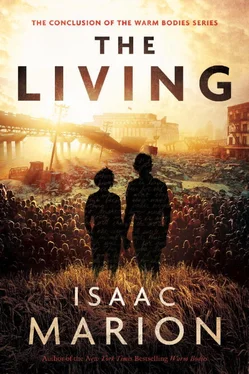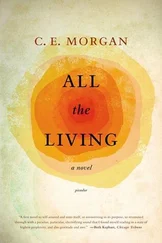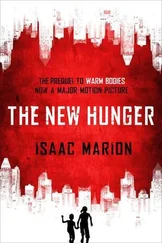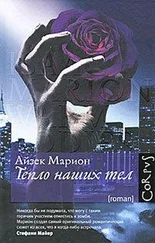Айзек Марион - The Living
Здесь есть возможность читать онлайн «Айзек Марион - The Living» весь текст электронной книги совершенно бесплатно (целиком полную версию без сокращений). В некоторых случаях можно слушать аудио, скачать через торрент в формате fb2 и присутствует краткое содержание. Город: New York, Год выпуска: 2018, ISBN: 2018, Издательство: Zola Books, Жанр: Ужасы и Мистика, ya, на английском языке. Описание произведения, (предисловие) а так же отзывы посетителей доступны на портале библиотеки ЛибКат.
- Название:The Living
- Автор:
- Издательство:Zola Books
- Жанр:
- Год:2018
- Город:New York
- ISBN:978-1-939126-38-2
- Рейтинг книги:4 / 5. Голосов: 1
-
Избранное:Добавить в избранное
- Отзывы:
-
Ваша оценка:
- 80
- 1
- 2
- 3
- 4
- 5
The Living: краткое содержание, описание и аннотация
Предлагаем к чтению аннотацию, описание, краткое содержание или предисловие (зависит от того, что написал сам автор книги «The Living»). Если вы не нашли необходимую информацию о книге — напишите в комментариях, мы постараемся отыскать её.
A WOMAN’S FIGHT FOR A WORLD WORTH LIVING IN
A HOPE THAT REFUSES TO DIE
The Living — читать онлайн бесплатно полную книгу (весь текст) целиком
Ниже представлен текст книги, разбитый по страницам. Система сохранения места последней прочитанной страницы, позволяет с удобством читать онлайн бесплатно книгу «The Living», без необходимости каждый раз заново искать на чём Вы остановились. Поставьте закладку, и сможете в любой момент перейти на страницу, на которой закончили чтение.
Интервал:
Закладка:
“So we’re really doing this?” she says, eyeing him cautiously. “A date?”
He shrugs again, waves a hand over his stomach, his ribs, the scars of all the wounds Nora stitched. “You’ve already been inside me. What’s a couple drinks?”
“Jesus,” Nora groans, clapping a palm over her eyes. “Let’s go before you charm me to death.”
They don’t say much as they cross the town and ascend the winding maze to the Orchard. They take stools at the bar, elbows resting on the rough texture of a hundred tiny carvings—jokes, quotes, doodles, or sometimes just names, alone or joined with plus signs. They remain lost in private contemplation until the sound of whiskey filling their tumblers pulls them out.
Marcus raises his glass. “Do you toast?”
“Last time I did, it was R’s toast. He said ‘to life.’”
“R,” Marcus chuckles, shaking his head. “Love the guy, but what a cheeseball.”
Nora raises her glass and clears her throat. “To world peace!”
“World peace!”
They clink their glasses and sip their whiskey. Nora likes the way its warmth spreads over her cannabis-cooled nerves. She instinctively glances at the TV above the bar, but all four of the Orchard’s flatscreens have bullet holes in them. She’s curious to see what the world is up to now that it’s able to tell her, but she can watch the news some other time. Right now she’s on a date.
“It’s packed in here,” Marcus observes, glancing around the crowded room and almost shouting to be heard. “There’s really only one bar for the whole stadium?”
“One bar for the whole city , unless the Nearlies have started opening businesses.”
Marcus watches people drink. He watches friends laughing, couples cuddling, hips moving to the noisy rock on the speakers.
“Maybe I’ll open one,” he says, and begins to nod to himself. “Maybe I’ll open a bar.”
“You could be your own bouncer,” Nora offers.
“Nah,” he says, shaking his head. “Tired of all that.” He smiles at the ceiling with a distant twinkle in his eye, then turns toward Nora, inviting her in. “I’ll be the piano player.”
Nora hides her grin behind her whiskey. It occurs to her that the idea of world peace might no longer be such a punchline. Naive? Probably. Premature? Certainly. But laughable ? These days, she’s not so sure.
“Put that one on the corner stack.”
“It’s too high. It’ll fall.”
“You hold that one and Alex, you hold that one, and I’ll put the curtain rod across. The weight will keep them up.”
“Like this?”
“Yeah, now I’ll just…there. Perfect!”
Sprout stands back to admire their progress and almost trips on the pile of architecture books scattered at her feet. She got them mostly for the pictures—from log cabins to government buildings, she soaks in the visual language and wonders what it means—but she has recently started skimming the text, too. She has no shortage of passion, but she’d like to buttress it with some solid theory.
Because this is no ordinary couch fort. In the history of sofa architecture, there has never been such ambition. Ten sectionals worth of cushions went into its construction, as well as nontraditional materials like road signs, car doors, and the awning of a liquor store. It fills the entire living room of this spacious suburban home, a house within a house. Sprout wonders if R and Julie will be mad when they get back, but she doubts it. The plywood wall patches, the bloodstained carpet…there are other houses they could have claimed if they wanted tidy lives.
“See how the curtain makes the south wall?” Sprout says, running her hand across the gauzy linen. “So you get privacy but still have natural light. You need lots of light when you’re working with small spaces.”
“Lots of light,” Alex says.
“Obviously,” Joan says.
Sprout is eyeing the last corner of unused square footage, thinking they could probably fit another closet in there, when she feels her stomach growl. “I need a snack,” she tells her friends. “But let’s start thinking about bathrooms.”
She drifts through the house, running her fingers along the walls, feeling the pebbled texture of the fresh paint, a bright yellow that will eventually strain their eyes and be covered with something softer, but for now…a statement.
The kitchen radio is on. So is the dining room radio and the living room radio and the bathroom radio, each playing a different broadcast. The effect is chaotic but exciting, like conversation noise at a party. The one in the kitchen is playing music, so she turns it up while she digs in the fridge. There’s something special about this music. It’s not an ancient recording of long-dead musicians—it’s live. It’s raw and messy, full of gleeful mistakes, and between songs the musicians are talking to each other.
She emerges from the fridge with an apple and some cheese from the neighbor’s sheep, tucks the portable radio under her arm, and takes her picnic to the back yard. Usually she’d invite her friends to join her, but she feels a need to be alone. Something about the music. The hue of the light outside. A faint whisper from somewhere in her head.
Silvery clouds roil above her, and the bristly yellow grass seems to reach toward them, begging for something to drink. The wet summer gave way to a dry autumn. The arid air makes her lips flaky, but it’s cool and crisp and electric.
“I love the new air,” she says to the air. “It’s like taking a bath in fizzy water. Can you feel it, Dad?”
She sets the radio in the grass and sits cross-legged in front of the marker.
“No one knows what’s different. They’re still trying to figure it out. But I bet you know, don’t you? I hope you can feel it too.”
No one knew Abram Kelvin well enough to guess what he’d want for his grave. What he would have wanted is no grave at all, believing he neither needed nor deserved a memorial. But as he often failed to realize while alive, the threads of his life were tied to many others, and they believed differently. So his daughter chose his marker: a small plank of lumber from the ruins of a nearby house, unpainted, unvarnished, soon to become earth. For his epitaph: just his name. The rest will be kept in the minds of the living, until they too become earth and surrender their stories to the Library.
“It’s like your drawings,” Sprout says, addressing her father’s grave though she knows he’s not in it, just a place to rest her eyes. “Remember when you showed me those drawings from when you were little? They were so ugly! You sucked at drawing, Dad!” She laughs and takes a bite of the apple, wild grown, unbelievably juicy and sweet. “But the ones from later were a little better ’cause you were more grown up. And if you didn’t quit, you probably would’ve gotten really good and drawn something really pretty. So it’s like that, you know?”
The clouds are shifting fast. Bright spots appear and sunlight bursts through, warming Sprout’s face with a golden glow. “Except the world’s not gonna quit,” she says, dribbling apple juice onto her chin. “’Cause we’re not gonna let it.”
She stuffs some cheese in with the apple. The combined flavor is strange, but she resists the impulse to spit it out, and as she continues to chew, her puckered lips ease into a smile of pleasure. Another discovery. Every day a new amazement. She opens her mouth to start talking about food, then closes it and cocks her head. She clicks off the radio and listens.
A distant whisper, like leaves rustling in a mile-high tree. She looks up. She listens. Her smile widens, revealing new teeth growing into the gaps.
Читать дальшеИнтервал:
Закладка:
Похожие книги на «The Living»
Представляем Вашему вниманию похожие книги на «The Living» списком для выбора. Мы отобрали схожую по названию и смыслу литературу в надежде предоставить читателям больше вариантов отыскать новые, интересные, ещё непрочитанные произведения.
Обсуждение, отзывы о книге «The Living» и просто собственные мнения читателей. Оставьте ваши комментарии, напишите, что Вы думаете о произведении, его смысле или главных героях. Укажите что конкретно понравилось, а что нет, и почему Вы так считаете.










